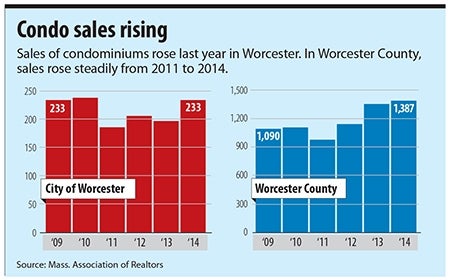Empty nesters help boost condo sales in and around Worcester
In the midst of struggling condo sales statewide, Worcester County is bucking the trend with empty nesters bolstering the residential segment that has traditionally been known as supporting first-time home buyers.
The Massachusetts Association of Realtors (MAR) reported a 33-percent increase in April condo sales over the previous April. This increase stands in contrast to the state, which saw a drop of 12.6 percent in April, with closed sales down for nine months out of the last 12, according to MAR.
Statewide, condo sales in 2014 were flat and have been up only slightly in 2015, said Timothy M. Warren Jr., CEO of The Warren Group. The market has been cooling off after exceeding sales of single-family homes beginning in 2012, when the housing market began a post-recessionary comeback and condos saw renewed popularity, he said.
“I think it's just taking a breather. They were popular and remain popular but are just not doing as well as single-family homes,” Warren said.
The strong condo sales reported by MAR are spread throughout Worcester County, said MAR Central Region Vice President David Stead. He estimates that much of this boom is due to downsizing empty nesters who are entering the condo market now after waiting out the recession to sell their single-family homes, where they had raised their families. While condos have traditionally been positioned as entry-level homes, older people looking to rid themselves of the big-house obligations are seeking out condos, Stead said. In the wake of an increasingly competitive housing market, where bidding wars are reportedly breaking out for prime properties, these empty nesters can now get a strong price, and move out of their large homes and into something that's more appealing for their current lifestyle, he said.
Empty nesters also want to transfer the burden of upkeep to the condominium associations after having borne that themselves in their single-family homes, Stead said. On the heels of the worst winter in recent memory, people don't want to worry about their roofs, shoveling snow or now mowing the lawn.
Lifestyle choices
“It's really a lifestyle thing,” Stead said. “People I talked to (this month) have a house on three acres in one of the surrounding towns and the kids are gone and they're like 'What do we need the big yard for?'”
Warren agreed that empty nesters seem to be flocking to condos in the last few years. The baby boomers represent a sizeable bump in population, he explained, and are also more open to living in an urban area as the perception of cities shifts.
“They used to think of the city as crowded,” Warren said. “Now they think of it as fun, exciting, and walkable.”
Accessibility is a key part of the condo equation, said David Bauer, the Massachusetts division president for Toll Brothers, which built the 276-home development Westborough Village. Included in the development are condos as well as single-family homes. For condo buyers, it all comes down to convenience, Bauer said, explaining that there have been a number of baby boomers moving into the community as they downsize.
“The condominiums are primarily not the typical family with children, they are more so the downsizing empty nester or we see a fair amount of single women. They are looking for the lifestyle and the social and community (scenes),” Bauer said. “If you can be walkable to public transportation and be in a town that has good amenities and shopping and good convenience, I think there is definitely a market there.”
Cities and towns in Central Massachusetts are increasingly focusing on walkable areas where people don't need cars to shop at several stores, according to Eric Smith, a principal planner at the Central Massachusetts Regional Planning Commission. Fostering walkable areas can be an “economic engine,” allowing people to keep their shopping local.
These empty nest buyers may be responsible for a narrowing of the price gap between condos and single-family homes. At a market peak in 2005, the median price of a condo, $288,000, was roughly $75,000 less than that of a single-family home, according to Warren. However, that gap has narrowed to $20,000 so far in 2015, with the median price of a condo at $299,000 and that of a single-family home at $319,900.
Baby boomers buying condos tend to go for the more expensive townhouse styles, which can range up to $500,000, said Jackie Cohen, a real estate agent with Coldwell Banker in Shrewsbury.
She has seen a continued demand for apartment-style condos among younger, first-time buyers in and around Worcester. Prices can range from apartment-style units that sell for $70,000 to townhouses that go for upwards of $500,000. Condos cover a broad market, she said, and the lower end is still accessible to those looking for an alternative to paying rent every month.
“It's your first step into buying something. So it's convenient having someone else handling everything at first,” Cohen said.










0 Comments